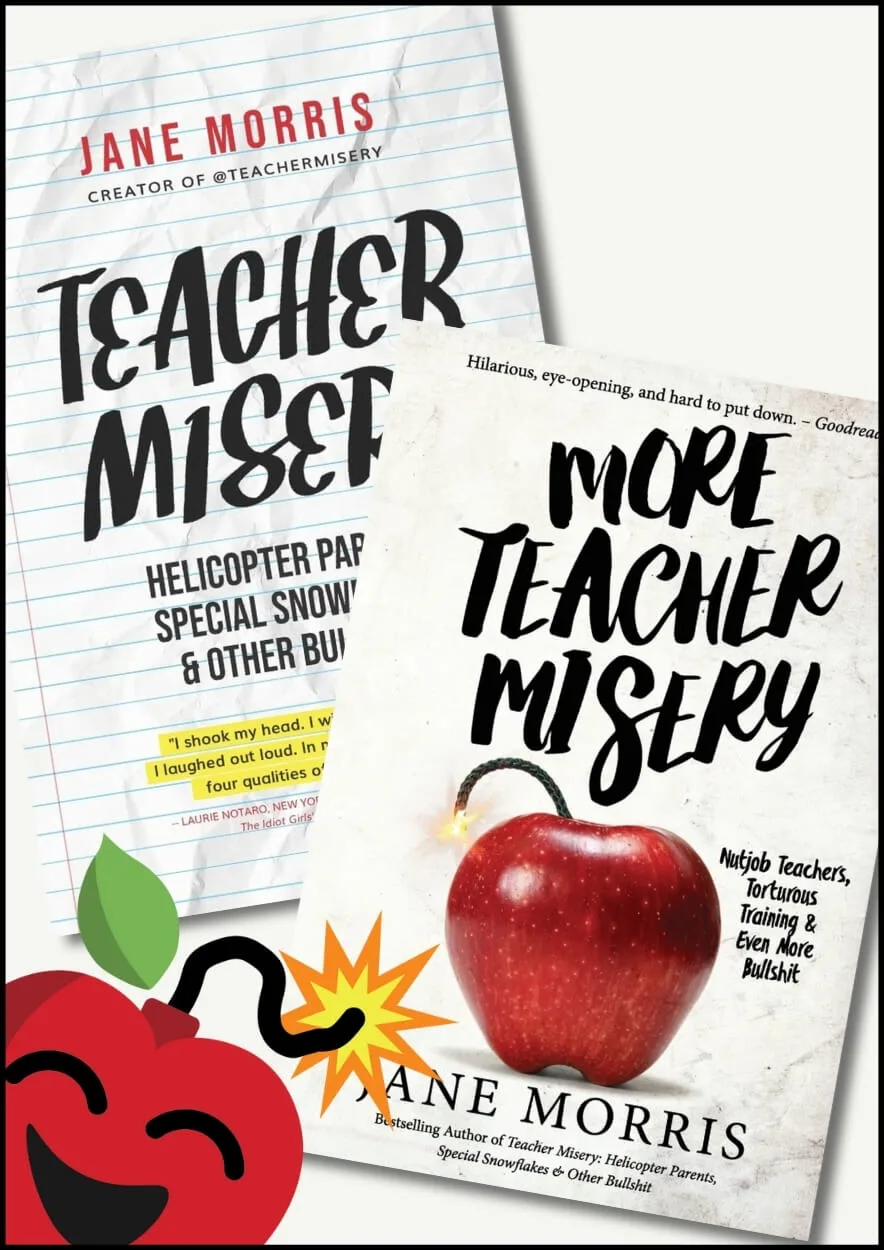A few weeks ago on the Teacher Misery Podcast, we were joined by Charlene Lynch, a former classroom teacher turned part-time teacher within a New York City school district and job/life coach. She worked for ten different school districts within the past 15 years in search of the perfect subject, grade level, happy hour crew, work-life balance, and pay scale that matches her expertise. And guess what…?
That job doesn’t exist!
But during her journey through all those school districts, leave positions, and regular teaching gigs, she picked up some helpful strategies to help handle the daily onslaught of stress and nonsense in teaching.
So, I’ve collected these tasty tidbits together in one nifty article. She has some truly excellent advice for struggling teachers looking to leave the profession or just keep their heads above water.
So grab your swimmers, fellow fighters. It’s time to dive in!
The Best Advice for Struggling Teachers (From a Professional Struggling Teacher)
From her very first day of teaching, Charlene kept trying to find that special district, grade, or class that would make the job less stressful until she discovered it was not there. Within those 15 years, she taught as low as third grade and all the way up to 11th grade. Her first gig was doing a maternity leave position for 5th-grade language arts, which was nowhere near her main subject of expertise, math.
She felt like she was learning alongside the kids, Charlene says. “When you’re 20-something years old, you’re like, I’ll take what I can get. I just need to get my foot in the door. I will figure this out. And I felt almost like a moving target all the time.”
Finally, Charlene realized that having math and science certifications and wanting to teach middle school made her quite marketable.
“I was young and crazy. I was like, yes, middle school. That’s the sweet spot. I love it. They’re not little where you have to tie their shoes and wipe their boogers.” At her first full-time placement, she uncovered her first bit of wisdom.
Lesson #1: The More I Open My Mouth, the More Trouble I Get Into
Early on, when people say, “Hey, how’s it going?”, you can say okay, fine, or great, depending on who the person is. But do NOT answer this question with, “I have a stomachache and you know what this kid said to me?” They will look at you like you’re nuts or spread around to others that you’re struggling with teaching (even if everyone else is barely coping with the stress of the profession too).

“I poured my heart out to this one person who is supposed to be, by trade, very empathetic. And they weren’t. It was the learning disabilities teacher consultant whom I had confided in because we had a lot of overlapping students. It was a resource room special ed math class. And I would just say, I’m struggling, man. I think I made a mistake.
So already there, don’t say that. That spread around, and I just had this mark on my back where it was very obvious that I wouldn’t get hired for the following year.”
Charlene felt alienated from other teachers because they didn’t want to be associated with her after hearing the gossip that she was struggling. “It was like the scarlet letter but less fun.”
That’s when she learned lesson #2.
Lesson #2: Don’t Let People Vent to You
“People started to vent to me, and it was soul-sucking because I’m so empathetic and able to listen with patience. I would get people who would just vent all the time. I would do them the courtesy of not telling other people what they were saying and validate them.

But then when I would go and vent to somebody else who I thought I could confide in, they would just be like, ‘Oh, that doesn’t happen in my class.’”
You must be wary of this type of person; horrible teachers are everywhere in the profession. And thus, lesson #3.
Lesson #3: Assume Everyone Is a Snitch
Just because you wouldn’t snitch doesn’t mean they won’t. And snitching isn’t just about things you did wrong. It could be about how you are a teacher struggling in general.
Even if you’re sitting with someone and you’re both pouring your hearts out to each other, they might use what you say against you later on. For some reason, sharing that kind of thing moves them up a little bit because administration likes hearing that stuff. And it gives them a little bit of power.
“I found out that I had several people I’d been confiding in who would confide back and talk plenty of crap about administration, but then they were going and repeating everything I was saying. Why was I so shocked? I don’t know.”
Lesson #4: Teach at a Large School or Find a Position with Multiple Roles
Getting hired for two different roles or positions, particularly in two different locations, makes it harder to micromanage teachers. One location will assume you’re in one place and vice versa.
Also, if you work in a large school with an extensive department, there are too many teachers to micromanage.
Lesson #5: Walk with Purpose Even If You Don’t Have One
If you walk quickly in the hallways, you seem to have something really important to do. People won’t bother you.
Hold a piece of paper or notebook, and if someone stops you, say, “I have another fire to put out.” They’ll back off of you and let you pass.
If you’re walking fast, you don’t hear or see anything and can’t get involved in nonsense. If you’re lucky enough to have a library with those little isolation booths, those are great because it feels serious that you’re in there, and no one will knock on the door or open the door to gossip. They have to have a real reason to bother you in there.
Lesson #6: Stop Giving a Crap
“Now that I care less about many things, I teach better than ever. As I got more into the life coach world and learned things about boundaries and saying no, I could ‘show up’ in a way that helped me protect myself.
I used to have to prove something to everyone. I had to get tenure. I had to have these fantastic lessons every time. Good observation reports. Who knew the results wouldn’t come when you motivated yourself with guilt and shame?”

Charlene’s goal is to help teachers stay in teaching if they can because she knows many of them do want to stay. But they feel so helpless, thinking the only option is to get out.
But if she could show people how to show up in a way that works for them, they might be able to stay and be happy. If you’re looking for straight-shooting teaching advice to keep you sane in the job, learning how to set effective and reasonable boundaries is at the top of the list.
Lesson #7: Hoard Your Time
One thing I ask teachers is how they are spending their time in school. It’s not to guilt teachers or shame them though. It’s more to think about what you are saying yes to.
Sometimes, you’re saying yes to many things you don’t want to do or doing things because you feel you have to do them, and you have to learn how to say no.
“I think that was one of the biggest things energy-wise for me. I just say no to things. I still feel bad because that’s quite a muscle to build. But I think in saying no, you set the precedent of, ‘Oh, she is going to say no. She is going to set that boundary.’”
Lesson #8: Take a Break
“I’ve said yes to so many things. And with being in so many different school districts and different settings, taking a two-year break was huge. So, it doesn’t have to be permanent if people are hesitant about full-on quitting. There will always be schools that need teachers, now more than ever.”
The toxic positivity rampant in teaching will so often make you feel like you can’t take time off. That your needs come second to your service to the students and the community.
This is a ruse. Don’t fall into the toxic trap! Your needs, especially regarding maintaining your physical and mental health, always come FIRST.
Lesson #9: Don’t Answer Right Away
We’re always so used to having the pressure of answering right then and there. Try saying, “Let me get back to you on that.”
And then sometimes, don’t even get back to them. If it’s that important, they’ll ask again.
We are used to answering 50 million requests in one minute like, “Can I still turn this in?” And maybe you’re not sure if you want to let them turn that in. You want to think about it, and that’s okay.
Lesson #10: Protect Yourself from Being Overstimulated
Schools are very overly stimulating places. It helps to know how to detect the signs of overstimulation and what to do when you are overloaded.
- Try to avoid the hallway when it’s overcrowded.
- Wear sunglasses to mitigate intense lighting.
- Practice mindful breathing, even in a hectic environment.
- Get noise-cancelling headphones and wear them in the hallway and if you have lunch duty.
If I ever had to do lunch duty again, I would have my noise-canceling headphones. Right after school, as soon as you get home, take a shower, and wash the day off.
Refresh. Reset. Repeat.
Get the Books That Started It All
Before the blog, the podcast, the merch store… there were the best-selling books.
If you like the content on this site, then you’ll LOVE the Teacher Misery books. They’re jam-packed with teaching insanity, ridiculous true stories, and all the commiseration about the profession you’ve come to know, adore, and respect.
Follow the links below to get your copies today!

We’ve Talked About Staying. Now, Let’s Talk about Quitting!
There are endless reasons to leave teaching, from the person to the systemic. The alternative yet crucial advice for struggling teachers is to seriously consider quitting. However, regarding leaving, you must love yourself enough to want things to change.
Forget everybody else, forget the kids. Forget what friends and family think, and what that little inner voice says.
It’s about having enough self-love to want to live a life that is not physically torturing you and that you enjoy.
I remember saying to my husband in tears a few days before I left teaching for good. “If I didn’t have to go back, I would feel like I was let out of prison, and I would be excited to live my life again.” Which means I wasn’t excited to live.
The time between work just was the time between having to be in prison. Now that I have left teaching, people are commenting to me about how different I am, especially people I don’t see regularly.
We have friends of ours that live like a good six hours away and they visit once or twice a year. Our kids are the same ages, and they would all sleep over. Every time they do this, I would go to bed early because they would be here on Friday, and you’re never more exhausted than Friday night.
I’d go to bed at 8:30, and then the 3 of them – the wife and husband as well as my husband – would stay up late drinking beers and talking. And they just knew Lauren didn’t do that. And then, this time, I kept them up. It was like four in the morning to the point where the kids were like-
“We heard you outside! You were so loud. It was so late.”
And they told me, who are you? Where have you been? This is amazing.
And I’m like, you guys know why, and they’re like, teaching did that to you. Now I want to do stuff. I don’t feel so exhausted that I’m hoarding minutes for myself to rest. I’ve come out of what became a shell of my old soul.
“It’s like in the summer, as soon as that last day of school hits, it would be like Grandpa Joe from Charlie and the Chocolate Factory. He’s slow at first, and then he sees the golden ticket. All of a sudden, he’s able-bodied, and he’s able to hold himself and Dance. That’s basically what June was like every time,” says Charlene.
I needed a week or two in bed just to sleep it off. The second half of June is for recovering. Your body is in shock, and it’s recovering. And then the panic comes in August. It’s a big fat Sunday.
I Can’t Make it Till the End of the Year
If you’re miserable and don’t think you can make it till the end of the year, you have to prioritize your health. Maybe you don’t know what else you can do, and you don’t know where to start. But you can quit teaching at any time, even mid-year.
And you don’t want to “let the kids down”. It probably feels like more work to leave. And that’s actually a way that cults keep their members in.
It’s a high exit cost. There are a lot of overlaps between teaching and being a cult.
You may not want to leave your insurance. But the health insurance may be used for the illness caused by being in school. You can easily get another job if you’re afraid of having no pay. It might not be your dream job, and you might not make as much money, but it’s temporary and a lot less stressful.
It’s Temporary
“Long story short, you figure it out. That’s easier said than done, of course. But there are so many other options, even if it’s not career-wise, while you’re figuring out your career. Back when I left, there wasn’t Uber, there wasn’t Lyft, there wasn’t Postmates,” says Charlene.
You can do all these services and make money during that time. This is your transition time. You are protecting your peace.
You’re not beating yourself up every day. You’re still making enough to pay your bills and take care of what you need to. You can be a server. You can be a bartender.
There are so many little things you can do temporarily as you transition to the next part of your life. There are plenty of other jobs out there for teachers.
Use Your Creativity
Be creative and think about what you enjoy doing where the time just goes by quickly. I know a couple of people who’ve become wedding officiants. And they charge a lot of money, especially if you’re in a place like New York.

You can go on the Universal Life Church website and get ordained for free, legally allowing you to marry people. You have to have the balls to say, “I’m a wedding officiant.”
But if you’re a teacher, you’re probably charismatic and comfortable speaking in front of people, and we’re talking about 20 minutes’ worth of work.
Tutoring is a Good Option
Tutoring in your subject area is a great option!
“I remember I did the math once, and it was empowering but also sad for how little I was making at one of the schools. Notoriously, private schools pay a lot less money. I had some really good clientele for tutoring algebra.
Who knew that so many people were so afraid of algebra that when I taught it, they were like, ‘Oh my God, you do such a good job! My kid actually listens to you.’ Five kids, twice a week, paid more than teaching. It’s a lot less prep and a lot less stress. Just put up a flyer in the libraries and use word of mouth. Sometimes it would come authentically if I was in pilates, and then I would overhear a conversation.
‘Oh my gosh, I’m an engineer. Why can’t I teach my own kid algebra?’ And I just looked over. I was like, nobody wants to hear algebra from their own parent. Here’s my number.’ Also, post on the local Facebook pages. There are all the mom groups that love stuff like this.”
What Are You Into?
If you’re into clothes, then go to thrift store store shopping! Thrift stores like The Salvation Army and Goodwill aren’t just good for buying clothes for teaching. They also have a lot of gems with good labels that somebody threw away.
You can buy and sell these gems on sites like eBay and Depop. You can make a lot of money doing this, especially if you know what you’re looking for.
Find a gig that meets your strengths and preferences.
“One of my friends works overnight stocking. He said there is nobody there. They just have the stuff, and he puts his headphones in. They work from 10 PM to 6 AM, and he has his day to himself. He loves it. You’re just doing the thing. No one’s bothering you. It’s so peaceful. And again, he’s protecting his peace and loves it.”
Buy Some Merch · Support the Site!
Teacher Misery is by the teachers and for the teachers. Our mission to improve the lives of teachers everywhere.
If you’d like to support the cause, buy yourself (or the burnt-out educator in your life) a gift from our merch store. And, YES, they are all as sarcastic as you’d hope. 😉
Every dollar supports the commiseration!

Struggling Teachers: It’s Not Your Identity Anymore
Just remember that it’s not something that you are seeking to make your identity. When teachers leave teaching, they say, “Oh my God, there goes my identity. If I’m not a teacher anymore, then what am I?” I was shocked by how many unexpected feelings I had when quitting teaching.
You can pursue other things that you now have time for. When you do the things for yourself, make the big leap and trust that something will come your way. That’s when things happen.
You’re stepping into your self-worth when you leave teaching because it’s breaking you down. You’ll leave, and maybe you won’t know what will happen next. And that’s usually when you’re able to regulate your body and just be kind to yourself and realize what you will go for instead of just settling for, that’s when the big things come through.
Leaving Teaching Opens a Channel
When you make a big decision like leaving a career, “You’re opening up a channel for opportunities, and some people will roll their eyes about things like that. But I absolutely 100 percent believe it. The more you believe things are coming, the more they do,” Charlene says.
There’s a book called Pronoia. The concept is the opposite of paranoia. Paranoia is worrying that things are not going well all the time.
Pronoia is a belief that things are always working out in your favor.

Now maybe that sounds a bit obnoxious. But it’s like the universe has your back because if you’re paranoid, you can believe the opposite.
Paranoia says things are always about to be wrong. But pronoia says great things are always about to happen.
Why not live that way? Whether it’s true or not, wouldn’t you rather live that way, thinking good things are about to happen rather than, “Oh my God, something awful is about to happen”?
DeAndre says, “I don’t chase, I attract what belongs to me, what simply finds me. I’m big on that.” This concept is backed by neuroscience. First, you have to look for the good things. Then as you do, the more they become on your radar, the more you attract them.
Whether you stay and work on preserving your energy and managing people at work or leave teaching for good, you will be okay. As the newly popular saying goes, “Everything is figure-out-able.” You might find yourself in a new job that is nothing like teaching with a smile and joy in your heart.
Whatever you choose, I’m proud of you for contemplating your choices.
